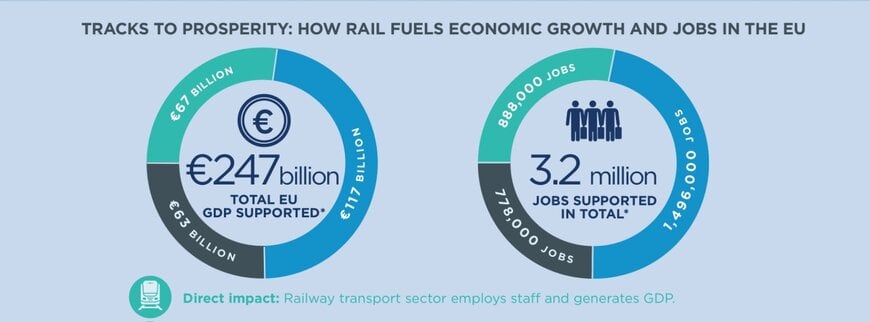Good for the planet and the economy: new study measures economic footprint of railways
A new study prepared by Oxford Economics confirms the strong economic impact of the European railway sector.
www.cer.be

Using 2023 data, the study commissioned by the Community of European Railway and Infrastructure Companies (CER) shows that rail combines above-average productivity with resilience and innovation, playing a central role in Europe's post-COVID-19 recovery and future growth. With a total contribution of €247 billion to the EU economy and supporting 3.1 million jobs, railways offer one of the largest economic footprints of any transport mode while preserving the lowest carbon footprint.
According to Oxford Economics, economic impact is measured in terms of gross value added (GVA) and employment:
As a sector, railway transport contributed a GVA of €67 billion to the EU27's Gross Domestic Product (GDP) in 2023. On top of this direct effect on the economy, railway transport's supply chain (indirect effect) generated a further €117 billion, while the wage-funded consumption of rail employees and their suppliers (induced effects) are recorded at €63 billion for a total GVA contribution of €247 billion. For context, this is equivalent to 1.4% of the EU27's total GDP in 2023, and exceeds Greece's 2023 GDP of €225 billion, the 16th largest economy in the EU27.
On the employment side, railway transport supports a total of around 3,162,000 jobs (direct, indirect and induced effects combined). This is equivalent to 1.6% of the EU27's total employment and exceeds the total employment in Ireland in 2023.
Overall, for every €1 of GVA generated directly by railway transport, a further €2.7 is stimulated in other sectors within the European economy. For every person employed directly by the railway transport sector, another 2.6 jobs are supported in its supply chain and through wages paid.
European railway transport offers many wider benefits beyond its short-term economic impacts. It supports GVA and employment in business sector services such as technical testing and analysis or R&D, wholesale and retail trade, such as machinery and equipment, as well as the construction sector. Furthermore, railways are crucial for defence mobility, facilitating the rapid and efficient movement of military resources across Europe.
The report highlights that, despite the disruption of the pandemic, the sector has rebounded strongly. Over the last decade, European railway transport has increased its productivity by 9.4% and furthermore enhanced productivity across other industries by enabling efficient transportation, thereby supporting economic growth more broadly.
With 8 billion passenger trips and 378 billion tonne-kilometres of freight transported every year over the EU's 201,000 kilometres of rail tracks, railways are at the heart of Europe's transport system. They are also driving its green transition thanks to high energy efficiency and close-to-zero emissions. Nevertheless, rail's modal share of passenger and freight traffic is stagnating and action is needed to build on rail's significant economic strengths through stable investments and constructive policy measures.
CER Executive Director Alberto Mazzola said: "For many people, railways have come to represent the green transport mode of choice that Europe should invest in to achieve its decarbonisation ambitions. The figures revealed by Oxford Economics in this new study, show that beyond its strong sustainability credentials, the rail sector is also an economic powerhouse boosting EU competitiveness, jobs and growth. As the EU reflects on the shape and size of its next long-term budget and a new action plan for high-speed rail, these findings shed new light on the value of railways and the cost of failing to achieve the long-strived-for shift to rail."
www.cer.be

